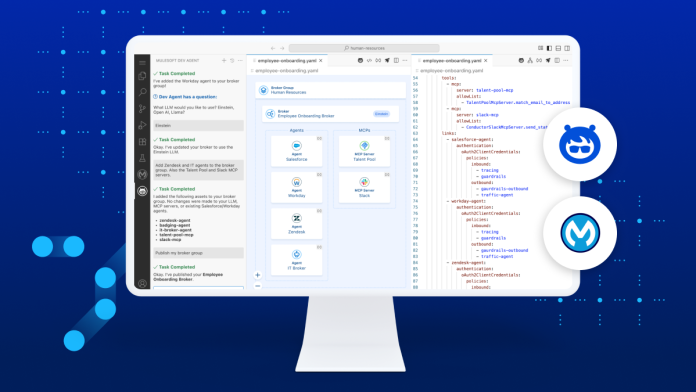In an era where artificial intelligence (AI) is swiftly reshaping business landscapes, handling the increasing volume of AI agents presents a formidable challenge for companies. Enter MuleSoft Agent Fabric, a new solution unveiled by Salesforce that aims to transform this complexity into cohesion. Small business owners, in particular, can find strategic advantages in this offering, provided they understand its practical applications and potential limitations.
MuleSoft Agent Fabric addresses a significant issue many enterprises face: agent sprawl. As the adoption of AI accelerates, businesses are inundated with various agents that are often left to operate in silos. This fragmentation can lead to disconnected workflows, redundant automations, and even compliance risks. The urgency for small businesses to adopt a solution that can manage these agents securely is underscored by projected growth; AI agent adoption is expected to skyrocket by 327% in the next two years.
This transformative solution offers several key features that aim to empower businesses to govern and orchestrate their diverse ecosystem of AI agents in a unified manner. MuleSoft Agent Fabric acts as a central nervous system for AI, enabling organizations to turn chaos into a seamless network that enhances productivity.
For instance, consider a small retailer experiencing difficulties in managing multiple agents for tasks such as inventory, pricing, and fraud detection. MuleSoft Agent Fabric ensures these agents work collaboratively rather than independently, streamlining operations. When inventory runs low, pricing can adjust automatically, and fraud checks can occur in real time, ensuring a smoother customer experience while adhering to governance standards that protect sensitive data.
MuleSoft’s offering comes with four core capabilities designed to simplify the complex landscape of AI agents:
-
Agent Registry: Serves as a central catalog where all AI agents are registered, making it easy for developers to locate and integrate them into workflows.
-
Agent Broker: Acts as an intelligent routing service, dynamically organizing tasks across various agents focused on specific business functions.
-
Agent Governance: Establishes robust guardrails for security and compliance, ensuring every agent interaction aligns with enterprise policies.
- Agent Visualizer: Provides IT teams with a clear, interactive view of the agent ecosystem, enabling them to monitor performance and troubleshoot issues effectively.
A real-world example of these capabilities can be illustrated in the mortgage application process. A "Mortgage Assistant" agent can coordinate efforts across various agents, such as credit checks and document signing. This interconnected workflow minimizes risks of errors and optimizes efficiency, which is essential for small businesses aiming to provide seamless services to their customers.
Yet, while the promise of MuleSoft Agent Fabric is compelling, small business owners should consider potential challenges. Implementing a unified solution necessitates investment in training for teams to manage and optimize the complex network. The effectiveness of governance measures also hinges on strict adherence to security protocols, which might require additional resources that small businesses are often trying to manage.
Andrew Comstock, SVP and GM of MuleSoft, emphasizes the strategic importance of such a solution: “The reality is, most enterprises live in a multi-vendor world, and that won’t change with AI. The strategic challenge isn’t building a single agent, but enabling all of them to work together." This sentiment highlights the importance of integration and collaboration across diverse tools, a vital aspect for any small business striving for efficiency.
Offering a more tailored approach, organizations like Barco and Wynn and Encore Las Vegas have reported the benefits of MuleSoft Agent Fabric in meeting their compliance and data security needs. Karthik Palani of Wynn remarks, “MuleSoft Agent Fabric is a strong fit to meet all our compliance and data security requirements across the highly regulated areas of our business.” This emphasizes that while the solution is rich with potential, it is equally critical for businesses to have the infrastructure in place for successful implementation.
As adoption of AI agents becomes more commonplace, MuleSoft Agent Fabric offers small business owners an opportunity to improve governance and orchestrate operations across their organizations. The solution promises to transform even the most disconnected processes into a cohesive, high-performing system. By leveraging this technology, small businesses can not only streamline their operations but also lay the groundwork for future scalability.
Implementing such innovative solutions will involve costs and human resources, but with proper groundwork, the transition can yield substantial returns. As Salesforce thrives in the integration landscape, the introduction of MuleSoft Agent Fabric enhances its footprint in the AI space, providing businesses with the tools needed for the next generation of digital workforce management.
For more information about MuleSoft Agent Fabric, you can access the official announcement here.
Image Via Salesforce



